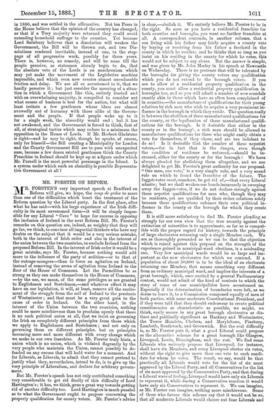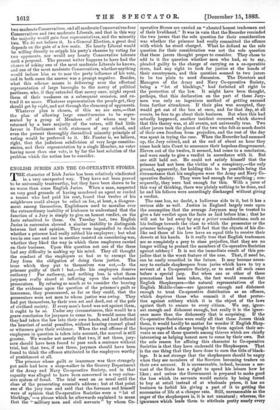MR. FORSTER ON REFORM.
TR. FORSTER'S very important speech at Bradford on ..LY.L Reform will give, we hope, the coup de grdce to more than one of the difficulties which beset the treatment of the Reform question by the Liberal party. In the first place, after what he has said—with his large experience of the Irish diffi- culty in its most envenomed form—it will be simply impos- sible for any Liberal " Cave " to hope for success in opposing the inclusion of Ireland in the next Reform Bill. Mr. Forster's remarks on this question are, indeed, so weighty that they will go far, we think, to convince all impartial thinkers who have any doubts on the subject that it would be a very serious mistake, both in the interest of Irish order and also in the interest of the union between the two countries, to exclude Ireland from the proposed Reform Bill. In the interest of Irish order it would be a great mistake, says Mr. Forster, because nothing would add more to the influence of the party of sedition—or to that of the outrage-mongers—than to force an agitation on Ireland, instead of removing the arena of agitation from Ireland to the floor of the House of Commons. Let the Parnellites be as strong as they can make themselves in the House of Commons, —by the use, we mean, of the same privileges as are granted to Englishmen and Scotchmen,—and whatever effect it may have on our legislation, it will, at least, remove all the excite- ment of the struggle from the soil of Ireland to the precincts of Westminster ; and that must be a very great gain to the cause of order in Ireland. On the other band, in the interest of the Union between the two countries, nothing could be more mischievous than to proclaim openly that there is no such political union at all, that we insist on governing the Irish on completely different principles from those which we apply to Englishmen and Scotchmen ; and not only on governing them on different principles, but on principles becoming more and more different with every change which we make in our own franchise. As Mr. Forster truly hints, a union which is no union, which is violated flagrantly by the very people who maintain the Union, cannot possibly be de- fended on any excuse that will hold water for a moment. And for Liberals, as Liberals, to admit that they cannot pretend to justify what they, nevertheless, intend to do, is to give up the very principle of Liberalism, and declare for arbitrary govern- ment.
But Mr. Forster's speech has not only contributed something very considerable to get rid finally of this difficulty of Lord Hartington's ; it has, we think, gone a great way towards getting rid of another difficulty too. Lord Hartington is much puzzled as to what the Government ought to propose concerning the property qualification for county voters. Mr. Forster's advice is clear,—abolish it. We entirely believe Mr. Forster to be in the right. So soon as you have a residential franchise for both counties and boroughs, you want no further franchise at all. A correspondent contends, in another column, that a son living with his father may fairly acquire a county vote by buying or receiving from his father a freehold in the county in which he resides; and he thinks that so long as you insist on his residing in the county for which he votes, this would not be subject to any abuse. But the answer is simple, and was given by Mr. John Morley in his speech at Newcastle on Wednesday. There is no pretence that will be tolerated by the boroughs for giving the county voters any qualification which you do not extend to the borough voters. If you are to allow of a residential property qualification in the county, you must allow a residential property qualification in boroughs too, and so you will admit a number of new scandals exactly akin to those which have so often been complained of in counties,—the manufacture of qualifications for their young relatives by rich men who wish to acquire a very prominent in- fluence in the borough in which they reside. The question really is between the abolition of these manufactured qualifications for the county, or the legalisation of these manufactured qualifi- cations for the borough. Is it desirable that either in the county or in the borough, a rich man should be allowed to manufacture qualifications for those who might easily obtain a vote for themselves, if they chose, and arc too indolent to do so? Is it desirable that the number of these nepotist voters,—for in fact that is the danger, even though the condition of residence be enforced,—should be in- creased, either for the county or for the borough ? We have always pleaded for abolishing them altogether, and we are delighted to get Mr. Forster's great authority for our proposal.
" One man, one vote," is a very simple rule, and a very sound rule on which to found the franchise of the future. The faggot-votes in ust, somehow, be got rid of,—that every Liberal admits ; but we shall weaken our hands immensely in sweeping away the faggot-votes, if we do not declare strongly against these nepotist qualifications for men who, though they may be residents, yet are qualified by their richer relations solely because these qualifications enhance their own political in- fluence in the county or the borough for which they create them.
It is still more satisfactory to find Mr. Forster pleading so strongly for our own view that the true security against the extinction of minorities is to approximate, as far as is compat- ible with the proper regard for history, towards the principle of large electorates returning only a single Member each. We are as thoroughly persuaded as we can be that the objection which is raised against this proposal on the strength of the experience gained in municipal-ward elections, is a misleading one. Very few municipal wards would be so large and im- portant as the new electorates for which we contend. If a population of about 50,000 is to be the ideal of an electorate returning one Member, that means something very different from an ordinary municipal ward, and implies the interests of a great borough, which, once excited by a general Parliamentary contest, would not admit of the kind of contests to which the story of some of our municipalities have accustomed us. Especially if the determination of boundaries were left, as we desire to leave it, to a Commission composed equally of men of both parties, with some moderate Constitutional President, and if they were told that they should endeavour to create political constituencies as characteristic as possible, we might, we think, easily secure in any great borough electorates as dis- tinct and politically significant as Hackney and Westminster, the Tower Hamlets, Chelsea, and Marylebone, Finsbury, Lambeth, Southwark, and Greenwich. But the real difficulty is, as Mr. Forster puts it, what a good Liberal could propose as the alternative scheme for a great borough like Glasgow, Liverpool, Leeds, Birmingham, and the rest. We find some Liberals who seriously propose that Liverpool, for instance, shall have six Members, and every Liverpool elector six votes, without the right to give more than one vote to each candi- date for whom he votes. The result, we say, would be that practically all Liberals would vote for the list of six most approved by the Liberal Party, and all Conservatives for the list of six most approved by the Conservative Party, and that during a Liberal wave of feeling, Liverpool would have only six Liberals to represent it, while during a Conservative reaction it would have only six Conservatives to represent it. We can imagine, as Mr. Forster can imagine, nothing more mischievous. Some of those who favour this scheme say that it would not be so, that all moderate Liberals would choose out foar Liberals and two moderate Conservatives, and all moderate Conservatives four Conservatives and two moderate Liberals, and that in this way the majority would gain four representatives, and the minority two. We do not believe it. In a General Election, a great deal depends on the gain of a few seats. No hearty Liberal would be willing directly to cripple his party's chances by voting for two opponents, nor would any hearty Conservative tolerate such a proposal. The present writer happens to have had the chance of asking one of the most moderate Liberals he knows, and one of the most moderate Conservatives, whether anything would induce him so to mar the party influence of his vote, and in both cases the answer was a prompt negative. Besides, what this scheme means is delivering over the effectual representation of large boroughs to the mercy of political partisans, who, if they extended that mercy once, might repent them of their weakness on a subsequent occasion, and ex- tend it no more. Whatever representation the people get, they should get by right, and not through the clemency of opponents. Whatever plan is chosen, of this we are sure,—that the plan of allowing large constituencies to be repre- sented by a group of Members all of whom may be returned by a bare majority of the voters, will find little favour in Parliament with statesmen of any school, and even the present thoroughly discredited minority principle of voting would be preferred to it. Mr. Forster is, we believe, right, that the judicious subdivision of very large constitu- encies, and their representation by a single Member, no voter having more than one vote, is by far the best solution of the problem which the nation has to consider.











































 Previous page
Previous page